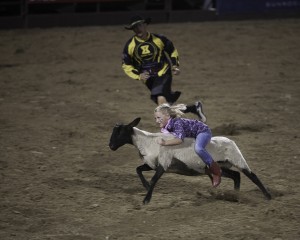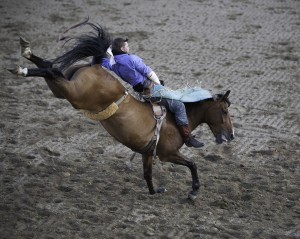The stadium is filled with the smell of horses, dirt and fresh popcorn. Children are clinging onto the hands of parents who are guiding grandparents to their annual box seating — three generations of rodeo goers. Seats are packed, and the place is filled as if a whole city came out for opening night.

The announcer blares over the speakers, quieting the stands for a brief moment, and that’s when it happens — nostalgia and tradition set in.
The Fiesta Days Rodeo in Spanish Fork was started 71 years ago by the Diamond Fork Riding Club, which is made up of school teachers, police officers, principals and other city members who own horses and know how to rope. But even before that, rodeos were created as one of the few forms of entertainment and tests of skill.
The tradition of rodeos go all the way back to the days of the pioneer, when individuals would have steer wrestling competitions or see who could rope cattle the fastest.
Even BYU was part of the tradition. The College of Biological and Agricultural Sciences sponsored the first and only BYU rodeo team club in the ’50s and ’60s.
Merrill Binks, a second generation affiliate of the Diamond Fork Riding Club, and member since 1962, said, “Sure I like bull riding and the clown act, but it’s the friendly atmosphere and the tradition of Spanish Fork that gets me back the next year.”
While rodeo is one of the toughest sporting fields in the world, and can draw a crowd for that reason alone, what draws the riders is, in fact, the tradition.
“I would come and watch the Fiesta Days rodeo when I was little with my family and always wanted to be one of the riders in it,” said Jessy Davis, a 10-year bareback rider from Salem, and 2007 Fiesta Days bareback winner. “Years later, I’m living my dream. I ride in about 80 rodeos a year, and Fiesta Days is still one of my favorites.”
Tickets sell quickly months in advance, not just because it is one of the only million dollar rodeos in the state, but because it is a traditional family-oriented event. Riders like Wesley Silcox hope to compete in front of their families.

“This is one of my favorite rodeos because, being from here, the whole family and community come out to support,” said Silcox, a world champion bull rider from Payson. “My family just lives up the street, and they come to watch me ride. It’s exciting.”
The event consisted of bareback riding, steer wrestling, team roping, saddle bronco riding, tie down roping, women’s barrel racing, bull riding, and of course, mutton bustin’, where small children ride a running sheep as long as they can.
Despite crowd pleasers like fast horses, angry bulls and brave sheep-riding children, the nostalgia felt as the Pledge of Allegiance rings out over muted conversations between reunited friends is still the reason Fiesta Days has been a 71-year-old tradition.
Fiesta Days will continue through July 24, beginning at 8 p.m. with pre-show events at 7 p.m. at the Spanish Fork Fairgrounds. Tickets start at $13.50 for adults and children.




